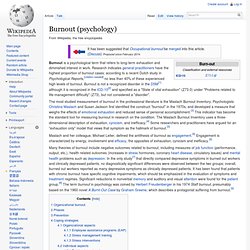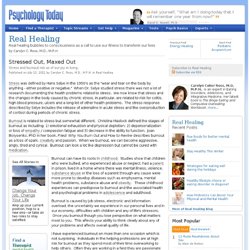

For your psychological health: How to avoid ragequit and burnout. Burnout (psychology) Burnout is a psychological term that refers to long-term exhaustion and diminished interest in work.

Research indicates general practitioners have the highest proportion of burnout cases; according to a recent Dutch study in Psychological Reports,[citation needed] no less than 40% of these experienced high levels of burnout. Burnout is not a recognized disorder in the DSM[1] although it is recognized in the ICD-10[2] and specified as a "State of vital exhaustion" (Z73.0) under "Problems related to life-management difficulty" (Z73), but not considered a "disorder". Maslach and her colleague, Michael Leiter, defined the antithesis of burnout as engagement.[6] Engagement is characterized by energy, involvement and efficacy, the opposites of exhaustion, cynicism and inefficacy.[6] Stressed Out, Maxed Out. Stress was defined by Hans Selye in the 1950's as the "wear and tear on the body by anything - either positive or negative.

" When Dr. Selye studied stress there was not a lot of research documenting the health problems related to stress. We now know that stress and the changes in the body caused by chronic stress, in particular, are related to risk for colitis, high blood pressure, ulcers and a long list of other health problems. The stress response described by Selye includes the release of adrenaline in acute stress and the overproduction of cortisol during periods of chronic stress. What_is_burnout.